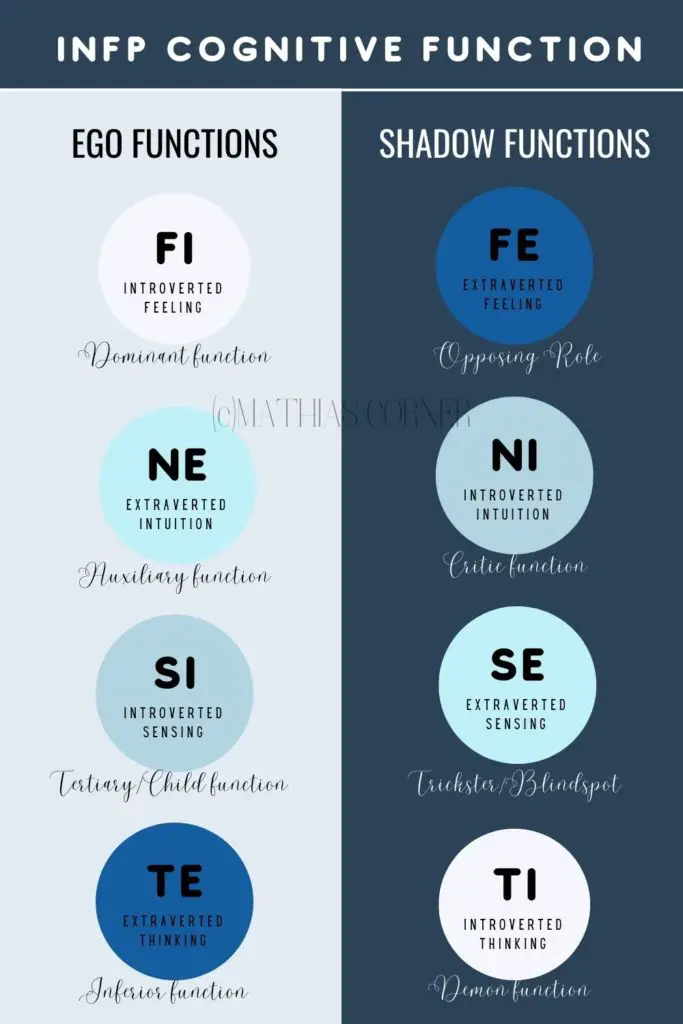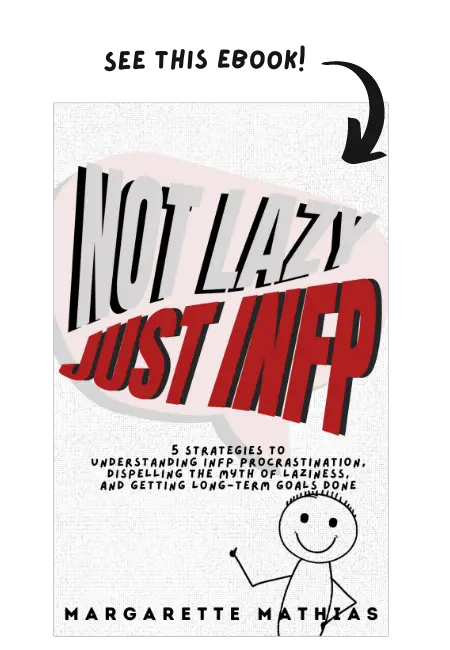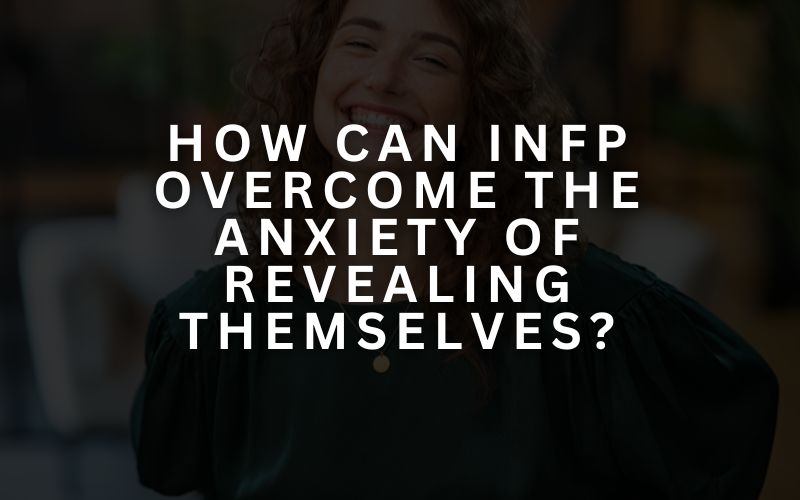INFP? Ah, yes, definitely one of the most mysterious personality types in MBTI.
People describe them as reserved, gentle, and empathetic, yet sometimes, there’s an air of mystery and distance between them and the others, telling of their aloofness, isolation, and independence.
Only a few see their childlike side, but even with close friends, their truest emotions remain off the map.
As an INFP, I admit I lived an extremely private life, consciously hiding everything about my personal life.
I’ve shed tears in silence. My pain, desires, and even happiness were masked with either a blank or innocent face.
And if one gets to accidentally peek into the filthy side of life — my inadequacies, embarrassments, and awful thoughts — my blood instantly runs cold. I’ll feel dizzy, I could faint.
My anxiety was that cosmic.
There’s an unnatural need to keep my “cool” charade. The next thing I know, I’m formulating excuses to counter their negative perceptions of me.
Yes, that was me. I purposely hid my dark side (and even my milestones) from prying eyes.
But just in the past months, who would’ve thought? I’m glad to announce that, finally, this anxiety has eased down. These days, if a friend asks me to share my deepest secrets, I can’t actually think of one!
I’m at the point where I overshare, forget whom I shared my stories with, and do not worry if I said too much.
I still live a private life, especially away from social media, but dang, I feel like the heavy shackles have finally been removed. It’s freeing, and I want to share how my journey unfolded and turned out this way.
If you’re an INFP struggling with an intense need for privacy, let’s dive into it. We’ll explore why INFPs crave privacy, when it becomes excessive, and if you want to be freed from the anxiety of opening up, we’ll tackle that, too!
But this whole change doesn’t happen overnight, okay? It’s not like you sleep for eight hours and bam, you magically became an extrovert!
Rather, it’s a slow, consistent mindset shift — a desire to change your habits — that could highly depend on your environment, too.
So are you ready? Here we go!
Why Are INFPs Too Private? Our Values (Fi) Vs. Harmony (Fe)
First of all, why are INFPs too private?
If we look into INFP’s cognitive stack, INFPs uphold their moral standards and authenticity above all. That’s Introverted Feeling (Fi) working as our default.
However, this Fi has a direct opposing role — the Extraverted Feeling (Fe) function, explaining why INFPs also yearn for harmonious relationships.
Look at the image below. Fi and Fe are sitting side by side. They’re two sides of the same coin.

As a result, this emotional dilemma confuses INFPs. For these empaths, they’re constantly torn between “me or them?” “Them, or me?”
“Should I take journalism or be a doctor as my mom wished?”
“Do I point out their mistake or keep quiet to save them from embarrassment?”
“Will I quit this job I don’t like, or stay a year more so I won’t disappoint the person who introduced me here?”
Yes, INFPs are stubborn to follow the values and desires of their hearts, but not so fast. If their actions cause trouble and burden for others, they can’t peacefully function either.
With this said, we can imagine why INFPs are often obedient kids. At an early age, they know what’s right and wrong. Plus, they’re pros in pleasing others.
Now, the worst case is, if an INFP’s stuck in a strict family or group forcing them to adhere to group morals. Chances are, being shut down will shatter INFP’s confidence to freely express. They’d rather keep their silence than deal with imposing people.
So if life at home, at school, or in the workplace boils down to people suppressing their ideas and authenticity, what should INFPs do then?
We gotta survive somehow, you know.
The defense is obvious.
Privacy.
INFPs go incognito. Overly strict rules can’t bind these idealistic souls. They’ll find a way to follow their authenticity in secret.
They leave zero traces of their ideas and game plans. Their whereabouts, hidden.
These Dreamers conceal their intentions. This private life becomes their sanctuary.
This way, INFPs protect their authenticity. At the same time, their actions won’t spark arguments among their families and friends, as long as they’re devoid of the facts. Thus, INFP’s obsession with privacy is born.
Problem solved… right?
Yeah, temporarily.
But not until INFPs are caught. They’ll get cornered and will be desperate to protect the sanctuary they built.
Want to know what happens when INFPs fight for their authenticity? I wrote a post about it!
That Time I Realized That I Don’t Have To Be Obsessed With Privacy Anymore
All this time, I just accepted that I’m a private person, and that’s who I am. However, a conversation with my INFP partner ended that perception.
My partner and I are in a long-distance relationship. Everyday, we talk through a video call.
But here’s the situation. I live in a typical Asian household. You know the drill—Asian family sticks together under one roof until you’re married. Privacy? Practically a myth!
So I’ve explained to him countless times that I feel awkward talking when my sister or mom is nearby. Even I couldn’t explain how quick it drains my soul.
This went on for more than a year, until one day, he finally asked the question:
Him: Why? Why do you feel uncomfortable?
Me: Uhm, I don’t want them to hear our conversation.
Him: But we’re just talking about our day.
Me: I don’t want them to hear me saying sweet nothings.
Him: And why not? I still talk to you even with my family around. Are you embarrassed about me?
Me: No! It’s not that… (and then I launched a whole list of reasons why video calls when my family’s around were impossible.)
I was quite annoyed having to explain something that should be obvious. Can’t he just accept that I don’t want to talk when my family’s around???
But truth be told, his series of whys actually helped. I pondered about the source of my fears and went down the rabbit hole.
Why does my brother talk to her girlfriend on the call — so loud — as if social anxiety’s afraid of him? On the other hand, why do I fall into a whisper when my family’s around? Why do I get offended when they ask about my plans? Why?
Don’t get me wrong, our family learned to be more expressive and less strict now.
Yet it turns out that my reactions are still rooted in the childhood fear that my family will meddle with my plans, and I’ll lose autonomy over my life again.
The constant fear, the need to tiptoe around someone else’s rules, and the suffocating weight of being disapproved still remain despite drawing clear boundaries.
Yes, it’s indeed a fear of losing my freedom.
But my point is, if we’re self-sufficient adults, we don’t need to hide anymore, right?
Whenever we fear people listening and are worried that they’ll take away our autonomy, we’re like grownups held captive by childhood rules.
At this time, I realized that I no longer need to be obsessed with privacy. I’m no longer hiding from anyone. I have full freedom to express my authenticity.
With that said, I went on a journey to healing the anxiety of revealing myself. Instead of hiding, I now purposely go out in the open.
These are the practices I did:
6 Practices that Can Help INFPs Overcome The Anxiety of Revealing Themselves
1. Healing the Trauma
According to Psych Central, trauma is a response to an intensely stressful event or situation that overwhelms you psychologically.
Now first, identify which stressful circumstances caused you to hide away from people. Was it your strict parents? The teacher who humiliated you? A friend that backstabbed you?
You have to make peace with those situations. Know that those experiences don’t have to define your present, so don’t live in the past.
You’re not that vulnerable kid anymore. You’re capable now, and you’ve grown.
At this time and age, remind yourself that you are in the driver’s seat of your life. You choose the destination, the route, and the speed.
Others might offer directions, but the wheel is yours to steer.
2. Hiding Your Weaknesses No More
You’ve probably heard the phrase, “Fake it ’til you make it.”
For the longest time, this was my unspoken mantra. But wow, pretending I knew everything or hiding my inexperience only made me anxious.
Truth is, honesty felt so much lighter.
So here’s what we can gradually do to make peace with our inadequacies and weaknesses:
First, understand yourself— your likes, dislikes, strengths, and weaknesses. Second, be honest and stop pretending.
Other personality types can fake it until they make it. Boy, they’re good and can get away with top-notch mediocrity!
But for INFPs, I believe we can only do that to a certain extent. I, myself, struggled with impostor syndrome far too often in my jobs. In doing so, I melt like wax every time my ignorance is discovered.
In the end, I can’t deal with the psychological strain I put on myself. I end up quitting.
So, here’s what to do instead: if you’re a beginner, admit that and say you’re willing to learn.
Like that one time the assistant principal expected me to overhaul an engine—I straight-up admitted I couldn’t do it. And guess what? They respected that and found other ways to solve the issue.
Sure, I worried they might be disappointed, but guess what? They’re still looking forward to working with me next semester.
Honesty hasn’t closed doors for me; it’s opened the right ones.
When you’re honest about your abilities, a huge weight lifts off your shoulders. You’re no longer carrying the pressure to pretend or live up to impossible standards.
Even better, being authentic attracts the right people—those who appreciate your true strengths and are willing to grow alongside you.
3. Share Your Life
You can overcome the anxiety of revealing yourself by, of course, actually revealing your story!
You don’t need to pour your heart out to just anyone. Rather, choose the people who genuinely vibe with you, those who make you feel safe and understood.
And when you do share? Try not to sugarcoat your story or make it look picture-perfect.
Just be honest. If you’re happy about your path, share it. If something’s bothering you, you can reveal that, too.
Share your pain, failures, and thoughts.
I, myself, learned that if I want to share my feelings, I shouldn’t hold back on tears, too. My voice sometimes cracks up, but I still say what I want to say. I don’t need to hide my tears.
My friends sometimes tease me that I cry so easily. But as I mature, I know my tears don’t come from sensitivity anymore.
It’s just that my tear ducts act like someone’s always cutting onions nearby. And surely, crying doesn’t mean we’re weak. It just means we feel a lot, appreciate a lot, and empathize a lot.
Share your wins, too!
In the same way, when you achieve a milestone or learn a new skill, yeah, don’t boast it, but I urge you to still reveal it in case people need your advice or service.
See, INFPs are jack of all trades. You’re rich with talents and skills. If you open up your capabilities to people, you’ll never run out of opportunities.
When I told my co-teacher that I write online, I got offered to teach “Reading and Writing” subject for the next semester. I declined it, though. Got a lot on my hands already.
When my churchmate needed to laminate some documents for the church, I told him we had a laminator and introduced our printing business.
Share one story at a time. Don’t keep it to yourself. You need to exercise those gifts!
4. Be Free from Thoughts and Emotions That Embarrass You
Also, I understand how hard it is to share your story when dealing with nasty emotions like greed, envy, hatred, and jealousy.
I mean, who wants to admit those thoughts out loud? It feels ugly and shameful.
Not to mention, INFPs can be heavily judgmental, too, especially with our strong inclination to personal values.
Admittingly, these are the most embarrassing thoughts I’ve hidden from the world, hindering me from opening up.
“Why am I jealous of their attention?” or “Why are they moving forward and I’m left behind?
But to be truly liberated from anxiety and fear, we must remove these bitter thoughts from our entire system.
It’s a long battle, but it’s workable.
I gradually changed through my faith in God. As for you, it’s your choice to seek ways to heal from negativities.
Research for advice. Work on yourself everyday.
And once we’re free, you’ll realize how much lighter life feels when you’re not overcritical of yourself and others.
Luke 6:45 For out of the abundance of the heart his mouth speaks.
5. Seek Wisdom From Others and Offer It in Return
I used to fear asking for advice, worried people would think I was incapable.
But now, I’m starting to love having a nice little counsel from time to time. I got a counsel at home, at work, at church, and even with my circle of friends.
I have this one question that I’ll ask to all my “counselors.” Lol.
Love the perspectives from a 3rd person view! But of course, I’m still kinda selective with who I talk to.
I mostly ask the caring, extroverted ones, the nurturing ones, or the deep, quiet ones – they’re the people INFPs can vibe with. I love their fresh ideas.
What’s more, when I share my story with them, they share theirs. It strengthens relationships and cultivate deep connections.
As long as you know you are the driver of your life and have autonomy over your decisions, it becomes easier to share your life with others, without the fear of them interfering with your final decision.
Their advice is just that—advice. The final choice always remains yours.
6. The Power to Say No
I used to avoid requests, ignore messages, and build walls so high that even I felt trapped.
Unfortunately, that intense independence and privacy led to constant anxiety.
A simple notification in my inbox could send my heart racing, with thoughts like, “What do they want from me now?” I even started blocking people without a second thought, assuming they were out to use me. It was exhausting.
So, how can INFPs overcome this fear and reclaim their peace of mind?
First, if you have a heart willing to help, then help! Second, when you can’t help, just say no. And once you’ve said no, let go of any guilt.
Practice saying no with confidence without over-explaining yourself and you’ll find more peace in your choices. You don’t have to hide and close all your doors.
You just need to learn how to politely decline.
That’s it! I hope this gave you insights about INFP privacy and how we can overcome the fear of revealing ourselves. 🙂
You may also like:
- Why INFPs Should Pursue Authenticity Despite Being Misunderstood
- INFP Privacy: 6 Reasons Why INFPs Keep Things Hidden
- 7 Things INFPs Need To Be Happy (And Ultimately Fulfilled)
Check out “Not Lazy, Just INFP” E-book! 🙂


